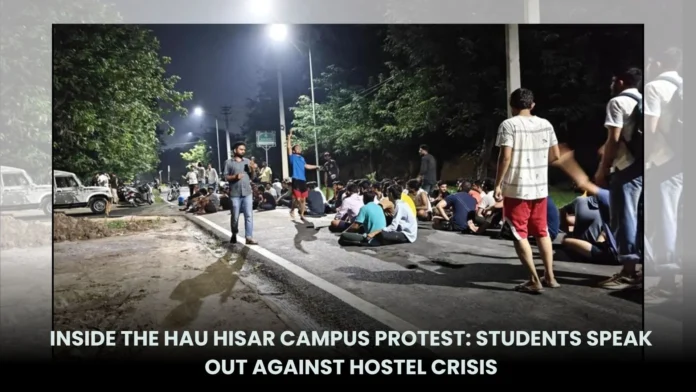HAU Hisar Campus Protest: A Movement for Dignity and Accountability
The usually quiet campus of Chaudhary Charan Singh Haryana Agricultural University (HAU), Hisar, is now the epicenter of a growing student agitation that highlights deeper issues plaguing educational institutions. What began as frustration over academic mismanagement and hostel policies has rapidly transformed into a full-scale student movement demanding justice, dignity, and transparency.
The Spark That Lit the Fire
On what should have been a peaceful end to the academic semester, students were met with what they describe as a “coercive and humiliating” response from university authorities. The administration, reportedly anticipating dissent, allegedly cut off water supply, closed down the mess, and ordered hostel evacuations with immediate effect.
The timing of these actions—right after semester exams—has drawn widespread condemnation from students. “This is not just mismanagement. This feels like a calculated move to silence us,” said Deepanshu, a BSc student participating in the protest.
A Cry for Basic Rights
Women Students Face the Brunt
For female postgraduate students, the situation has been especially distressing. Many were reportedly denied food and pressured to vacate their hostels despite prior permissions to stay during the summer break.
A WhatsApp message from Additional Warden Nidhi Kamboj, now circulating on social media, confirmed this directive: “Postgraduate students who have permission for staying in summer break are allowed to stay otherwise no one will be allowed.”
Students allege that the communication lacked clarity, and the abruptness of the decision left them scrambling for basic necessities.
A Protest Fueled by Broken Promises
What’s driving the protest isn’t just the hostel eviction—it’s a broader sense of betrayal. Students accuse the administration of going back on previous government assurances.
Exam Controversy Adds Fuel to the Fire
A particularly contentious issue involves postgraduate students being marked “failed” online, despite verbal commitments from the government panel that exams would be reconducted in three weeks.
One MSC student said, “We were told to wait. Instead, we were failed. What kind of system is this?”
The protestors are now demanding a written acceptance of their eight key demands, which include academic fairness, humane hostel policies, and accountability from university officials.
From Sit-In to Stand-Off: What Happens Next?
With no mess facilities and restricted hostel access, students have resorted to cooking meals at the protest site, transforming their sit-in into a full-fledged survival protest.
They’ve issued a clear ultimatum: if their demands are not officially accepted by July 2, they will move to shut down the university.
“We’re not going anywhere,” said Deepanshu. “We’ve been left with no choice but to fight for our dignity.”
The Administration’s Side: A Clash of Narratives
In stark contrast to the student testimonies, the university administration has maintained that hostel vacation after exams is standard procedure.
A varsity spokesperson insisted that the steps taken were not targeted or retaliatory. However, these claims are contradicted by students, who point to the timing, lack of notice, and sudden withdrawal of basic facilities as evidence of intentional suppression.
Allegations Against the VC
The situation has further escalated with student leader Rohit Dalal accusing Vice-Chancellor Prof. B. R. Kamboj of ignoring the government’s prior commitments, particularly those made by Minister Mahipal Dhanda.
“He’s turning his back on us, and blaming us for simply asking what was promised,” Dalal asserted.
The Bigger Picture: A Glimpse into Institutional Power Dynamics
This isn’t just a local issue—it’s a reflection of the growing disconnect between university administrations and student communities across India.
What’s unfolding at HAU Hisar mirrors larger trends:
- Authoritarian administrative practices.
- Neglect of student voices in decision-making.
- Widening trust deficits between students and authorities.
Student Voices: Stories of Anguish and Resolve
Meet Aarti, an MSc second-year student who was told she could stay for research work. “Suddenly, they say you’re not allowed. My luggage is still in the room. I haven’t eaten since last night.”
Or Rohit, a final-year UG student, who stayed back to complete internship documentation. “We were called ‘troublemakers’ for asking basic questions about exam results.”
These stories, though individual, paint a collective picture of resilience, frustration, and a call for reform.
What’s at Stake?
For the students of HAU, this protest is not just about food or exam scores—it’s about the right to be heard. It’s about ensuring fair treatment, especially when the very institutions meant to nurture them act in ways that seem to undermine their wellbeing.
What Needs to Change?
- Transparent Communication: Sudden directives via informal channels like WhatsApp only deepen confusion. Official notices, timely announcements, and student consultations are necessary.
- Academic Fairness: Marking students failed when reassessments were promised is not just an error—it’s an ethical breach that demands accountability.
- Humane Hostel Policy: Students staying back for valid reasons—research, documentation, internships—should not be penalized. Access to food, water, and shelter are basic rights, not privileges.
- Respect for Commitments: When a government panel makes a promise, institutional heads must uphold it. Ignoring such assurances corrodes public trust.
Final Word: A Movement Worth Watching
The protest at HAU Hisar is gaining momentum. What began as a sit-in could very well turn into a statewide student movement if grievances continue to go unheard.
Whether the university chooses to engage in meaningful dialogue—or continue the path of indifference—will determine not only the fate of this protest, but also the institution’s standing in the eyes of the students and the public.


